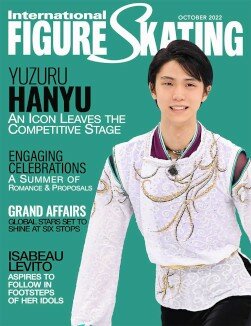

Carolina Kostner is adding one final chapter to her long and distinguished career. The 30-year-old returned to the competitive arena in January, but the reason or her comeback has little to do with medals and titles.
This time it is all about skating for herself.
It had been a rocky ride for Carolina Kostner since that magical night in Sochi, where she claimed the third step of the podium at the 2014 Olympic Winter Games.
A few months later she was banned from competition for 21 months because of her association with a former boyfriend — an Olympic-level athlete — who tested positive for doping.
Kostner felt she had lost her way in life. She left the university in Torino where she had been studying and moved to Rome to complete her art history degree. While there, she joined a ballet group, and trained seven days a week.
The changes were good for the soul Kostner said. “I was able to study; I was able to learn the art of dance and I was able to spend more time with my family and friends. This gave me a lot of strength and brought me back to my roots. It is important to never forget where you came from.
“These past two years have been difficult for me. It was hard to understand, to accept and to forgive. It changed my life completely — my private and professional life was turned upside down. I had nothing that I could hold on to anymore. It forced me to leave my comfort zone.
“But what is important to me is that I was able to turn the negative things into something positive. When the ban ended in December 2015, a huge weight fell off my shoulders. Then I was able to start looking forward to the future again and to make plans.”
NEW RHYTHM
When Kostner returned to the sport in early 2016, she did so with a new perspective and a desire to push her own artistic and technical boundaries.
“I slowly started skating again. It was my wish to polish my technique in a way that I would be able to include into my skating everything I had learned artistically in the past two years,” the eight-time national champion explained. “It would be my dream to combine those two things. Deep inside I realized that I just love what I’m doing and I can do it only now and not in five or 10 years.”
Rather than return to her former coaching situation, Kostner did something few would have anticipated — she approached Alexei Mishin and asked if she could train with him. Having previously attended summer camps run by the Russian coach she knew and liked his method of teaching.
Mishin hesitated, unwilling to give her an immediate answer. “He thought about it. He is a person that tells you straight what he thinks,” Kostner said. “I respect the time he took to decide. It was fine because I was also thinking for a while about it.”
When Mishin finally agreed to coach her, Kostner started working with him at his annual spring and summer training camps and also spent some time in Russia. She said that from the outset she knew she had made the right choice.
“I felt comfortable right away and I feel I have integrated very well,” Kostner said of her new training environment. “We have a great practice group in St. Petersburg. The young skaters are all great, and also Sasha (Alexander Petrov), Lisa (Tuktamysheva) and Andrei (Lazukin) are nice people and hard working skaters.
“When we are working we are working, but we also can have coffee and a chat together. We motivate each other and convey our strengths to each other. I think it is really important that we have a good practice group.”
Kostner also fell in love with the beautiful city of St. Petersburg — its palaces, historic buildings, parks, theatres and museums. “I am not there all the time, but the city is fantastic,” she said. “Last September they had a catamaran regatta on the Neva River and an Italian team participated. They invited me to a practice cruise one morning. It was amazing. We were able to see all the beautiful buildings from the water.
“It is a very cultural city. Once I went to a theatre on a Sunday morning at 11 and it was full. There are performances seven days a week, which is great.”
Toronto-based choreographer Lori Nichol, with whom she has worked for many years, was the only constant Kostner brought with her into this new era.
This season they chose two rhythmic drum pieces, “God of Thunder” by Kitaro and “Bonzo’s Montreux” by John Bonham for the short and “Nisi Dominus” (Cum Dederit) by Antonio Vivaldi, for the free. The Psalm (“Unless the Lord”) is an unusual and interesting choice.
“There is a long story behind this piece of music. I was reading about it and thought it was very inspiring,” Kostner explained. “First of all, Vivaldi was Italian and he is one of my favorite composers. His music was written such a long time ago but still feels real. The piece is very beautiful and I fell in love with it right away. Since it was my first time to be able to use lyrics in competition, the decision was not difficult to make.”
Known for being innovative and creative in her choice of programs and music, Kostner does not shy away from unique pieces, even those she knows will likely not be universally popular. An artistic person in every sense, she is constantly looking to step out of the box and take her skating to another level.
THE HIGH ROAD
When the idea of returning to completion arose, people were divided. There were those who were for it and others who were not so sure. In a rare move, Kostner’s mother Patrizia spoke out and said her daughter would determine herself when her competitive career would end and that it would not be decided by anyone else.
In January 2017 Kostner returned to Ostrava, a Czech city near the Polish border where she had celebrated her breakthrough on the international stage 14 years earlier. It was there that Kostner had claimed her first international medal, a bronze, at the 2003 World Junior Championships.
After not having competed since the 2014 Games, many wondered how she would fare at the European Championships, the first major international competition in her comeback year. But there was little to be concerned about.
Though she was not in top form Kostner skated into third place overall, capturing her 10th medal in 10 consecutive appearances. “An Italian journalist told me that apparently, this is a record,” said Kostner, who has five gold, two silver and two bronze medals from her previous appearances at the European Championships.
“I don’t really think about records and counting medals, but it gives the medal from Ostrava a different meaning than my last or my first one. This medal might be a material symbol, but for me it is the beginning of a new chapter. I don’t know yet where this journey will take me and I don’t even want to know yet. I just want to be carried by my emotion and by what is coming next.
“I don’t see this so much as a comeback — it is more of a continuation of my career. Now it is kind of a challenge to see how far I can get. I just hope to realize my vision of skating. I think I am still far from it and I need to take each step — it does not make sense to jump over some steps.”
Even though she has competed on international stages for more than a decade, Kostner admitted she still gets nervous at competitions. In the past, nerves were often the reason she was not able to perform her best, especially when she was younger.
But this time around her nerves are not so much of a problem. “Before Europeans I focused mostly on my skating, because this is what I can work on,” she said. “I knew that everything else does not depend on me. I felt that I would have fun, because I was looking forward to it. There was much more joy than anxiety or fear. Obviously, when things go well you always have positive memories and you feel the adrenaline and the energy.”
In Ostrava, a lot of attention and hype surrounded her return to competition. A Swiss newspaper inaccurately labeled her comeback as that of “the last diva.”
Kostner skated early in the short program due to her low World ranking, but the mixed zone, which is usually empty for the early flights, was full of television crews and print journalists waiting to interview her.
Mishin, never a friend of pre- or in-competition interviews, dragged his student away after a few television segments were completed. But a short while later the Italian team leader brought Kostner back to the mixed zone, where she fulfilled all her media obligations with a wide smile.
At the exhibition gala, she skated a five-minute routine set to “Clair de Lune.” The audience in the sold-out arena was spellbound and erupted in wild applause at the end of her program.
Kostner has always been one of the most popular skaters on the circuit. Her gentle personality and undeniable talent have made her a role model and an inspiration for a generation of young skaters. She is friendly and respectful and everyone who gets to know her loves her.
“I really adore Carolina. She is a wonderful person and it is a pure joy to be with her on the ice,” said Elizaveta Tuktamysheva. “Carolina has amazing skating skills and choreography. I am very glad that she joined our group.”
Anna Pogorilaya, the 2016 World bronze medalist, said she welcomes Kostner’s return to competition. “In figure skating, the focus is more on the jumps than on the components. Therefore, I appreciate Carolina coming back, because not many skaters can be at such a high level for a long time. We try not to make it kids’ skating, but women’s skating. I always enjoyed women’s skating, even when I was little.”
Kostner headed to the World Championships in late March with the same mindset she had going into Europeans. Skating eighth in a field of 37 in the short program, Kostner skated into eighth place. “The program was not very good. You have to be realistic, see the mistakes and do better next time,” she said.
Despite a couple of technical errors in the free skate, Kostner ranked fifth in the segment and captured sixth place overall. “There were so many different feelings. It was like an explosion — lots of excitement and joy and also a bit of tension,” she said. “When I decided to come back I asked myself: ‘What if I am not successful as many people would expect me to be?’ But this confirmed my decision to come back and what I am doing gives me a lot of power.
“The outcome of all this means much less to me than the journey itself. I hope I can share my love and my passion for figure skating.
(Originally published in the IFS May/June 2017 issue)




